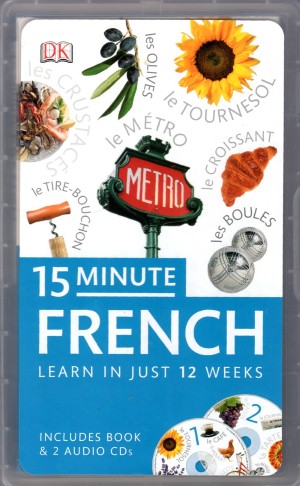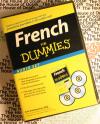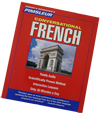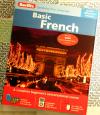15 Minute FRENCH - 2 Audio CDs and Book - Learn to Speak French

15 Minute FrenchDK Eyewitness Guide by Caroline Lemoine A complete course with Book and 2 60 minute CD's |
 |
15 Minute French Book and 2 Audio CDs - Learn French in 15 minutes a dayBrand New Book and 2CDs Parlez-vous Francais in just 15 minutes! What can you do in fifteen minutes?...Wait in a supermarket queue? Flick through the latest celebrity magazine? Now with this revolutionary new system for learning a language you can learn French in just 15 minutes a day and speak and understand the language with confidence. This unique visual approach makes learning quick, easy and fun. No homework, no writing, no fuss. Practice just 4 times a week for 3 months. Includes ready-reference features, cultural tips, and newly commissioned photography for a true flavour of the culture. Just use the cover flaps to hide the answers so you can test yourself as you learn. 15 Minute French is an innovative approach to learning the basics of a language. The guide is divided into sixty 15-minute learning units. The recommendation is that you learn four units a week and revise on the fifth day, completing the whole course in just 12 weeks. Now there is no excuse learn French today! About the Author
About the French Language French is a Romance language originally spoken in France, Belgium, Luxembourg, and Switzerland, and today by about 350 million people around the world as either a native or a second language, with significant populations in 54 countries. French is a descendant of the Latin of the Roman Empire, as are languages such as Spanish, Italian, Catalan, Romanian, and Portuguese. Its development was also influenced by the native Celtic languages of Roman Gaul and by the Germanic language of the post-Roman Frankish invaders. It is an official language in 31 countries, most of which form what is called in French La Francophonie, the community of French-speaking nations. It is an official language of all United Nations agencies and a large number of international organisations. Per the Constitution of France, French has been the official language since 1992 (although previous legal texts have made it official since 1539, see ordinance of Villers-Cotterêts). France mandates the use of French in official government publications, public education outside of specific cases (though these dispositions are often ignored) and legal contracts; advertisements must bear a translation of foreign words. In addition to French, there are also a variety of regional languages. France has signed the European Charter for Regional Languages but has not ratified it since that would go against the 1958 Constitution. The majority of French words derive from Vulgar Latin or were constructed from Latin or Greek roots. There are often pairs of words, one form being popular (noun) and the other one savant (adjective), both originating from Latin. Example: * brother: frère / fraternel < from Latin FRATER The last example, Saint-Étienne/Stéphanois, illustrates common practice for gentilics throughout France. In some examples there is a common word from "vulgar" Latin and a more savant word from classical Latin or even Greek. * Cheval—Concours équestre—Hippodrome The French words which have developed from Latin are usually less recognisable than Italian words of Latin origin because as French developed into a separate language from Vulgar Latin, the unstressed final syllable of many words was dropped or elided into the following word. The French counting system is partially vigesimal: twenty (vingt) is used as a base number in the names of numbers from 80–99. The French word for eighty, for example, is quatre-vingts, which literally means "four twenties", and soixante-quinze (literally "sixty-fifteen") indicating 75. This reform arose after the French Revolution to unify the different counting system (mostly vigesimal near the coast, due to Celtic [via Basque] and Viking influence). This system is comparable to the archaic English use of score, as in "fourscore and seven" (87), or "threescore and ten" (70). Belgian French and Swiss French are different in this respect. In Belgium and Switzerland 70 and 90 are septante and nonante. In Switzerland, depending on the local dialect, 80 can be quatre-vingts (Geneva, Neuchâtel, Jura) or huitante (Vaud, Valais, Fribourg). Octante had been used in Switzerland in the past, but is now considered archaic. In Belgium, however, quatre-vingts is universally used.
|
15 Minute French Book and 2 Audio CDs - Learn French in 15 minutes a day |
| Retail: | $39.95 |
| On Sale: | $36.95 |
| You Save: | 8% |
| Stock Info: | Out Of Stock |
| Receive In Stock Notification |

 0 Items (Empty)
0 Items (Empty)








